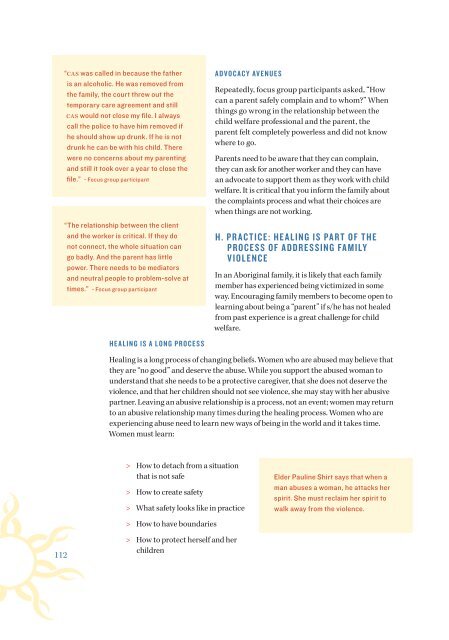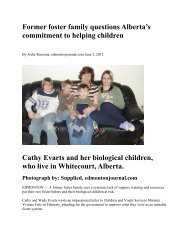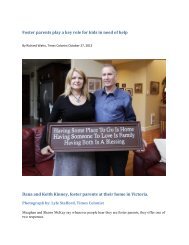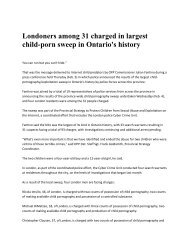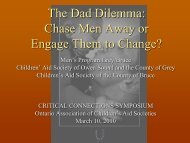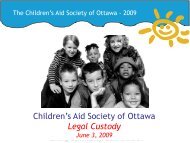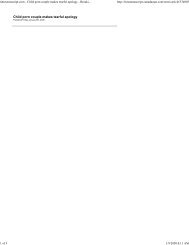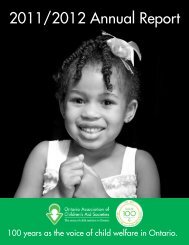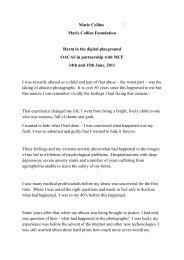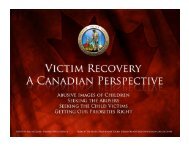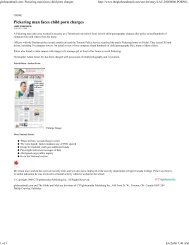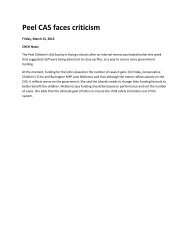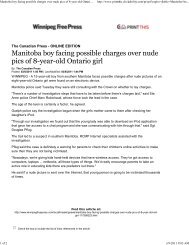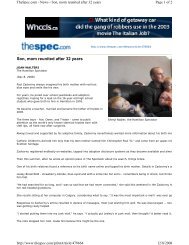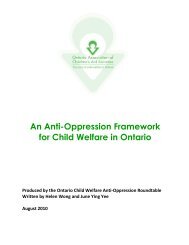English - Ontario Association of Children's Aid Societies
English - Ontario Association of Children's Aid Societies
English - Ontario Association of Children's Aid Societies
Create successful ePaper yourself
Turn your PDF publications into a flip-book with our unique Google optimized e-Paper software.
“CAS was called in because the father<br />
is an alcoholic. He was removed from<br />
the family, the court threw out the<br />
temporary care agreement and still<br />
CAS would not close my file. I always<br />
call the police to have him removed if<br />
he should show up drunk. If he is not<br />
drunk he can be with his child. There<br />
were no concerns about my parenting<br />
and still it took over a year to close the<br />
file.” - Focus group participant<br />
“The relationship between the client<br />
and the worker is critical. If they do<br />
not connect, the whole situation can<br />
go badly. And the parent has little<br />
power. There needs to be mediators<br />
and neutral people to problem-solve at<br />
times.” - Focus group participant<br />
HEALING IS A LONG PROCESS<br />
ADVOCACY AVENUES<br />
Repeatedly, focus group participants asked, “How<br />
can a parent safely complain and to whom” When<br />
things go wrong in the relationship between the<br />
child welfare pr<strong>of</strong>essional and the parent, the<br />
parent felt completely powerless and did not know<br />
where to go.<br />
Parents need to be aware that they can complain,<br />
they can ask for another worker and they can have<br />
an advocate to support them as they work with child<br />
welfare. It is critical that you inform the family about<br />
the complaints process and what their choices are<br />
when things are not working.<br />
H. PRACTICE: HEALING IS PART OF THE<br />
PROCESS OF ADDRESSING FAMILY<br />
VIOLENCE<br />
In an Aboriginal family, it is likely that each family<br />
member has experienced being victimized in some<br />
way. Encouraging family members to become open to<br />
learning about being a “parent” if s/he has not healed<br />
from past experience is a great challenge for child<br />
welfare.<br />
Healing is a long process <strong>of</strong> changing beliefs. Women who are abused may believe that<br />
they are “no good” and deserve the abuse. While you support the abused woman to<br />
understand that she needs to be a protective caregiver, that she does not deserve the<br />
violence, and that her children should not see violence, she may stay with her abusive<br />
partner. Leaving an abusive relationship is a process, not an event; women may return<br />
to an abusive relationship many times during the healing process. Women who are<br />
experiencing abuse need to learn new ways <strong>of</strong> being in the world and it takes time.<br />
Women must learn:<br />
> > How to detach from a situation<br />
that is not safe<br />
> > How to create safety<br />
> > What safety looks like in practice<br />
> > How to have boundaries<br />
Elder Pauline Shirt says that when a<br />
man abuses a woman, he attacks her<br />
spirit. She must reclaim her spirit to<br />
walk away from the violence.<br />
112<br />
> > How to protect herself and her<br />
children


